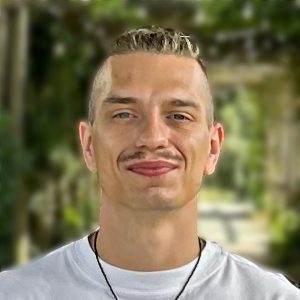
About Tomas
Tomas Vanderkam is a Psychology Honours student passionate about studying coping mechanisms employed by Ukranian resistance fighters.
He currently works in the Reactions to Environmental Stress and Trauma (REST) lab led by Dr. Seudfeld. Their research explores the concept of post-traumatic growth, highlighting the personal growth and resilience that can emerge after surviving severe traumas.
Follow along to learn more about Tomas’ family history, personal experience, and research passion:
Could you tell us why you are interested in this project and provide a brief overview of what the project is trying to accomplish?
What I can tell you about my motivation for doing this project is that my entire mother’s side of the family is in Ukraine. We have family over there (Ukraine) who are fighting right now. We have family over there who have fallen, unfortunately. So, I am extremely personally motivated to look into resilience, especially and specifically, as part of coping.
My lab, Reactions to Environmental Stress and Trauma (REST), is under the leadership of Dr. Suedfeld, a highly regarded scholar with significant expertise in research related to Holocaust survivors and related topics. Our lab is a ‘positive psychology’ lab which is sort of funny because positive psychology usually talks about how to optimize mental well-being on an average Tuesday going to and from work and how to have a happy normative life. But this is a positive psychology lab where we primarily look at the positive psychology that comes out of the worst life experiences. So there is literature for instance of what is called post-traumatic growth. That is a huge component of what we do at REST lab.
My own personal experiences with going to Ukraine, meeting not only my family but especially the older folks in Ukraine. What is really striking is how sharp and put-together people are until the day they die. It’s quite common to have your grandparent up on the roof one day and then pass in their sleep. There does not seem to be the same, in both physical and mental health, degradation of well-being. There’s something really striking happening in Ukraine, and it appears to be a fusion of cultural elements and, well, I’m not entirely certain, but I am absolutely convinced that a significant part of it is rooted in the intense history of the war.
I was someone who was raised on stories of war, on stories of resilience, on stories of it can happen again, so be ready. Now, of course, with the war, it’s especially relevant to look to not just normative everyday, average Tuesday mental well-being, but also the mental well-being that can arise after objectively some of the worst experiences that you could go through.
Could you explain some of the methods used in collecting data for your research given that you are not in Ukraine? What results do you expect from this study?
We’re not in Ukraine right now, and I am not prepared to go to a war zone for my undergraduate research at this particular point. So how are we doing this research? What we have access to is two databases that total about 100-150 interviews or monologues with survivors of Soviet concentration camps of gulags, mostly from the 1970s.
The methods that we are going to. be applying to these samples are thematic content analysis measures. We have three main ones at our lab. We have “integrative complexity” (IC), “motive imagery” (MI), and we have “coping”. Those three variables collectively constitute the bases for understanding individual experiences, with a particular emphasis on those in high-stress situations, to put it mildly.
So, to break those three variables down a little bit, integrative complexity is basically how thoughtful, and nuanced is the thought that a person is expressing in an interview. Are they expressing simple, one-sided viewpoints like “let’s get those bastards,” or are they engaging in a more nuanced and thoughtful analysis of a complex issue, considering various aspects and potential solutions? That’s what we refer to as integrative complexity. You could think of it as just thought complexity. Motive imagery is a relatively self explanatory concept. It pertains to the types of motivations people describe in their narratives. Are they primarily motivated by desires for freedom, power, or perhaps a desire to be left alone?
People, Ukranians, in this context, could forseeably have a wide variety of reasons to resist. This is a population of resistors, primarily. The people who are put into Soviet concentration camps were not usually your average, you know, hoodlum, speaking out about whatever. Those people were put into camps, too. But the samples that were looking at or what the Soviet Union described as particularly dangerous state criminals. These are often times just people who believed in a free and independent Ukraine and believed in it a little too publicly.
Regarding coping, it’s another relatively self-explanatory aspect. It focusses on how these individuals are managing and dealing with their circumstances after the fact. But I don’t like the word coping. Actually, I don’t like that descriptor for that measure because coping sounds like you’re licking your wounds, right? You’ve had trauma, but your coping suggest you’re lucky if you get back to baseline, something like that right? But there’s a whole component of coping that I’m particularly interested in which is “resilience”. How are people growing? How are people integrating these experiences and the narrative of what doesn’t kill you makes you stronger?
It sounds like there is a cultural component to the research you are conducting. How may your results apply to people in Canada or others outside of Ukraine?
That is a great question. Right now, the samples that we are looking at do not really shed much light on that. But for the comparison that we want to make, future research is needed. For this project, the comparison we are looking to make is between primarily nonviolent versus violent resistors. There was certainly a wide variety of resistance strategies that would end people being labeled, particularly dangerous state criminals.
In our history, we had armed resistance and mischievous, political agitation. But within my family, among my uncles and great uncles, there was a rather tongue-in-cheek attitude. This might’ve served as a coping strategy, considering the circumstances.
In your opinion, how do individuals’ personalities and social statuses influence and drive their actions during these exceptionally challenging times?
Right. We know that humor, place a huge role in being able to deal with the most severe stresses of life. So yes, it encompasses everything from mischief to comedy inspired civic activism.
You mentioned how your research looks at positive psychology in traumatic contexts. How does this clash of ideologies and research topics manifest in your project? Are there specific considerations when examining concepts through the lens of positive psychology instead of other perspectives?
This is a great inroad to address, what you asked a couple minutes ago, about cultural differences. Indeed, there is a significant cultural gap between western psychology and the rest of the world. In the west, there’s a strong emphasis on maximizing normative day-to-day experiences.
That is my favourite thing about being at REST Lab! Our focus is on studying reactions to environmental stress and trauma, rather than reactions to something like a long queue at a 7–Eleven, traffic, or simply disliking one job.
The cultural component of having a history of war has a huge bearing on personality traits, such as conscientiousness. In Western psychology, we often analyze day-to-day experiences through models like the Big Five, which are applicable in various situations, including high-stress scenarios. But we are tempted to make these conclusions that conscientiousness, as part of the five-factor model, has to do with keeping promises day to day, such as sending that email to Jim as scheduled or paying bills on time. We know that conscientiousness correlates with positive mental and physical health outcomes, encompassing self-care broadly. But what happens when the duty that you need to perform is not normative? What is the responsibility isn’t as routine as sending an email or paying a bill?
Do you think familiarity with war experience can significantly impact an individual’s ability to cope with the current situation in Ukraine?
Yeah, I would certainly imagine so. We definitely do see a disparate attitude towards conflict at all levels between the West and East (broadly speaking). In the West, we do see an emphasis on every day, politeness, de-escalation, and real avoidance in a lot of cases. And, of course, among populations who have had no choice but experience conflict, there is much more readiness to deal with the subject, and there is much more resilience.
Can you learn resilience and can it be applied to everyday life?
Yes, you can learn resilience. There’s a line that runs between the two categories. The same coping strategies and resilience strategies that are used by a disgruntled 7-Eleven customer can be applied to our resistance fighters. The scale and intensity differ significantly. One noteworthy example is positive reappraisal. It is a vital coping strategy, allowing individuals to genuinely recognize the strengths that have developed within them. Even if they had no alternative, but to endure those experiences, they can choose appraise those experiences differently. And, that is something that ties together all levels, and magnitudes and forms of resilience.
What is the key message or insight for readers to take away from this?
Yeah, I think if there is a take-home message from this work, it’s “facing conflict is important, and we need people who are willing to do it”. Many of us are averse to even touching on the subject matter either because it’s stressful to talk about or difficult to think about what people might be going through. Watching distressing news, images, like people in distress amid the rubble, is unsettling for everyone. But, there is real need, especially in the West, for looking at hard, non-normative situations, and really good non-normative situations too. We should approach these non-normative situations by assessing social and personality variables, through the lens of resilience, strength, and the creation of sustainable and virtuous pathways for future generations to have faith in. That would be the take away.
You mentioned the need to consider non-normative solutions to some problems we face today. Did you arrive at this conclusion independently through research and/or personal experiences, and is this sentiment shared within the lab or your work environment?
I came to that conclusion both from my own life experience and through my work in research. Coming from a family that openly discusses topics like war, it has always been prominent in my mind. But when I arrived at UBC, it became more apparent to me—the pressing need to examine non-normative, especially challenging situations.
It was a huge breath of fresh air when I found REST lab. I feel very privileged to be working under Dr. Suedfeld and to show up to a lab where really everybody is working on a project to do with some sort of genocide or cultural violence or war. At REST lab, even though the topics are weighty, we approach our work with great enthusiasm. We’re eager to delve into subjects that others may shy away from, tackling challenging topics many labs or individuals might avoid.
For those interested in tracking the research’s progress and outcomes, how can they access that information in the future?
I’ll be presenting at PURC (Psychology Undergraduate Research Conference) so they can find me there in April!

